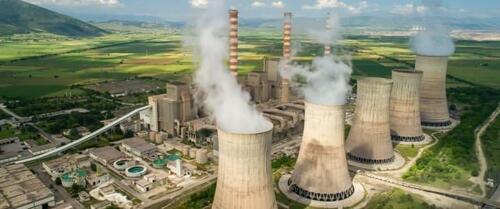
By Tsvetana Paraskova of OilPrice.com
The French electricity grid is at higher risk of strained power supplies in January 2023 than previously estimated due to lower nuclear power generation, France’s power grid operator RTE said in its latest winter preparedness analysis on Friday.
Delays in routine maintenance work at France’s nuclear power stations will lead to a slightly lower nuclear availability this winter than expected back in September, the grid operator said. This raises the risk of a power supply crunch in January, RTE said.
The main uncertainties in France’s power supply are gas supply, the energy situation in neighboring countries, demand, and the rate of restarting of French nuclear reactors, the operator noted.
Nuclear power generation in France has suffered setbacks this year, and currently, just over 50% of the French nuclear power fleet is available.
Early this month, power giant EDF revised down its estimate for the 2022 French nuclear output to 275-285 TWh, compared to the previous estimate of 280-300 TWh. This lowered estimate takes into account the impact of strikes on maintenance schedules in the autumn of 2022, as well as outage extensions at four nuclear reactors involved in the program of inspections and repairs related to the stress corrosion phenomenon, EDF said in a statement.
France, traditionally a net exporter of electricity, even became a net importer of electricity in the first half of 2022 due to the issues at its nuclear power plants.
After a drought in the summer, water levels at hydropower reservoirs are back up to normal for this time of the year, while very high gas storage levels in France and the rest of Europe mean that French gas-powered electricity supply will not be threatened this winter, the operator said.
RTE stressed that under no circumstances does France run a risk of a “blackout”, that is, a total loss of control of the electricity system.
During periods of strained supply, France could avoid outages by reducing consumption by between 1% and 5% in the base-case scenario, and by up to 15% in the worst-case scenario, RTE said.
By Tsvetana Paraskova of OilPrice.com
The French electricity grid is at higher risk of strained power supplies in January 2023 than previously estimated due to lower nuclear power generation, France’s power grid operator RTE said in its latest winter preparedness analysis on Friday.
Delays in routine maintenance work at France’s nuclear power stations will lead to a slightly lower nuclear availability this winter than expected back in September, the grid operator said. This raises the risk of a power supply crunch in January, RTE said.
The main uncertainties in France’s power supply are gas supply, the energy situation in neighboring countries, demand, and the rate of restarting of French nuclear reactors, the operator noted.
Nuclear power generation in France has suffered setbacks this year, and currently, just over 50% of the French nuclear power fleet is available.
Early this month, power giant EDF revised down its estimate for the 2022 French nuclear output to 275-285 TWh, compared to the previous estimate of 280-300 TWh. This lowered estimate takes into account the impact of strikes on maintenance schedules in the autumn of 2022, as well as outage extensions at four nuclear reactors involved in the program of inspections and repairs related to the stress corrosion phenomenon, EDF said in a statement.
France, traditionally a net exporter of electricity, even became a net importer of electricity in the first half of 2022 due to the issues at its nuclear power plants.
After a drought in the summer, water levels at hydropower reservoirs are back up to normal for this time of the year, while very high gas storage levels in France and the rest of Europe mean that French gas-powered electricity supply will not be threatened this winter, the operator said.
RTE stressed that under no circumstances does France run a risk of a “blackout”, that is, a total loss of control of the electricity system.
During periods of strained supply, France could avoid outages by reducing consumption by between 1% and 5% in the base-case scenario, and by up to 15% in the worst-case scenario, RTE said.






